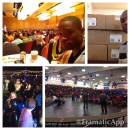What is truth?
Does it exist? Is anything universal? How many truths can exist at once?
Dictionary Definition
truth [ trooth ]
1. something factual: the thing that corresponds to fact or reality
2. true quality: correspondence to fact or reality
3. true statement: a statement that corresponds to fact or reality
Jullien’s Definition
Truth is every universal law within a defined universe.
Most people would say that gravity is a universally true law…until you’ve been to space. Within the context of Earth, gravity is true and it may even be true in other parts of the BIG universe, but we know that the law of gravity doesn’t apply itself in the same way on the moon or other planets we are aware of. Therefore, the more we expand our internal universe (or you-and-I-verse or conversation), the less truth we will find. Less truth isn’t a bad thing—less truth means getting to the universal core that binds us all. From this core, every other truth is derived from the diversity of perspectives and interpretations of what happened.
The opposite of truth is not a lie or wrong—the opposite of truth is simply someone else’s truth. It could be us that’s thinking small or them that’s thinking small—usually we think it’s them. Most facts are still interpretations and just because a majority of people believe them doesn’t make them true. For centuries it was believed that the world was flat. But, the conversation expanded, and ultimately people came to know the world as not flat, but round. Facts are true to the beholder, but they aren’t truth. Truth is omnipresent, always happening, and doesn’t need to be proven. Anytime we claim something as fact, we cut ourselves off to the real truth and future learning.
There is a fine line between MY truth and THE truth. What’s true for me may not be true for you. For example, if I believe in Jesus and you believe in Buddah, our truths are different. Separately, we are fine. Conflict only arises when one of us feels like the other person’s truth is encroaching on our own. At the same time, what is true for me could also be true for you one day. One day you could be Christian and I could be Buddhist if both of us are able to expand the boundaries of our limited thinking and internal universes causing us to both be more open.
We can only access each other’s truths, worlds, and universes if we listen to each other and the core truths within us. Listening involves conversation and a genuine interests to understand to a point where we’ve felt like we’ve walked in someone else’s shoes and seen the world through their point of view or their truth. Until then, we drift in confirmation bias, meaning that we only seek out evidence that confirms our world view and we discard any evidence (and sometimes people) who challenge it.
For me, truth has come from curiosity and curiosity comes from a mindset of not knowing. I’ve found that stepping into spaces with the mindset of not knowing has led me to more truth that pretending like I know and then being disproved by a stronger argument, thesis, or evidence. How can we know the truth if none of us by ourselves can see the full picture? This cartoon of 6 blind men trying to decipher what they are experiencing is captures it best.




